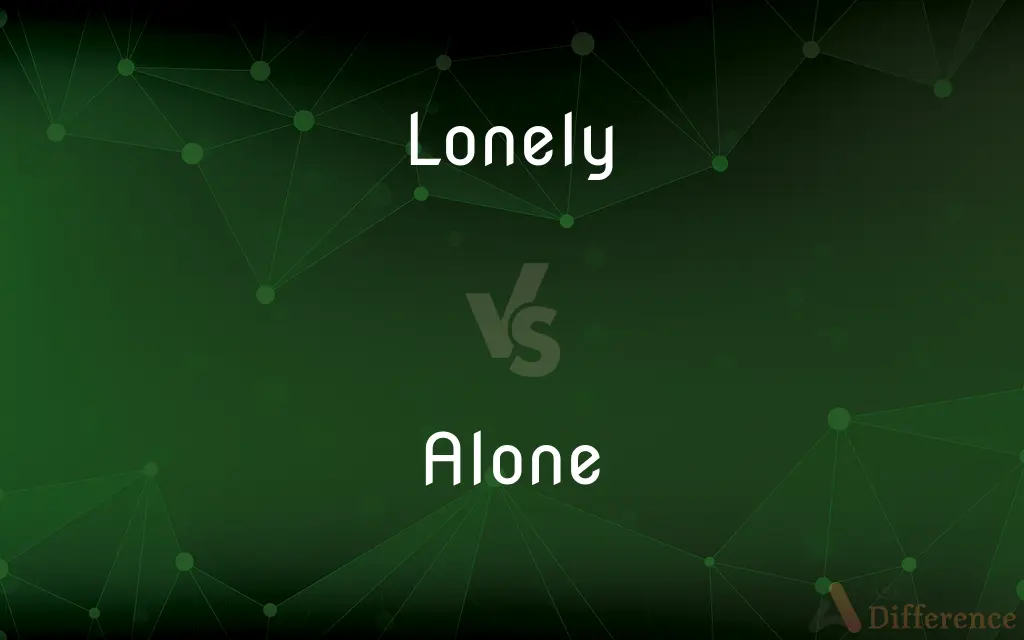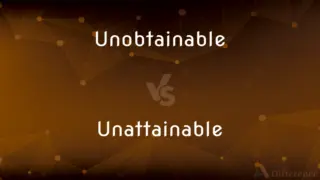Lonely vs. Alone — What's the Difference?
Edited by Tayyaba Rehman — By Fiza Rafique — Updated on October 12, 2023
"Lonely" describes a feeling of sadness from lack of companionship. "Alone" means being by oneself, regardless of feelings.

Difference Between Lonely and Alone
Table of Contents
ADVERTISEMENT
Key Differences
"Lonely" and "Alone" both touch on the concept of solitude, but they represent different aspects of it. "Lonely" is an emotion, a feeling of sadness or distress due to a lack of companionship or a sense of isolation. This feeling can occur even when surrounded by people. "Alone", on the other hand, is a state of being. It's a fact or condition of being solitary, of being the only one present.
One can be "Alone" without feeling "Lonely". For instance, someone might cherish their moments of solitude, finding peace when they're alone without feeling any sense of loneliness. In contrast, someone can be in a crowded room or among friends and still feel "Lonely", signifying an emotional disconnect or a sense of not belonging.
"Alone" is neutral and doesn't inherently carry a positive or negative connotation. It simply describes a state. "Lonely", however, is inherently negative. It describes a longing for connection, for companionship, for a sense of belonging. It's possible to combat loneliness with connection, even if one remains physically alone.
It's essential to understand that while "Alone" is objective, "Lonely" is subjective. Two people can be in the exact same situation, and while one might feel lonely, the other might not. This highlights the emotional depth of "Lonely" compared to the factual nature of "Alone".
Comparison Chart
Nature
Emotional
Factual
ADVERTISEMENT
Definition
Feeling of sadness due to lack of companionship
State of being by oneself
Dependency
Can feel lonely even in a crowd
Describes a solitary state
Emotional Weight
Carries a negative emotional connotation
Neutral
Subjectivity
Subjective, varies from person to person
Objective, based on the actual situation
Compare with Definitions
Lonely
Desolate; solitary.
The cabin stood in a lonely spot.
Alone
Having no one else present.
She was alone at home.
Lonely
Isolated from others.
The lonely island was uninhabited.
Alone
Having no one else present; on one's own
She was alone that evening
He lives alone
Lonely
Feeling sad because of a lack of friends or company.
She felt lonely in the new city.
Alone
Indicating that something is confined to the specified subject or recipient
He is answerable to Parliament alone
It was a smile for him alone
Lonely
Sad because one has no friends or company
Lonely old people whose families do not care for them
Alone
Having no one else present; on one's own
He lives alone
She was alone that evening
Lonely
(of a place) unfrequented and remote
A lonely country lane
Alone
Indicating that something is confined to the specified subject or recipient
He is answerable to Parliament alone
It was a smile for him alone
Lonely
Dejected by the awareness of being alone.
Alone
Being apart from others; solitary.
Lonely
Producing such dejection
The loneliest night of the week.
Alone
Being without anyone or anything else; only.
Lonely
Without others of a similar kind; lone; solitary
"a lonely band of lawyers up against the might of the American legal establishment" (Nick Kotz).
Alone
Considered separately from all others of the same class.
Lonely
Unfrequented by people; desolate
A lonely crossroads.
Alone
Being without equal; unique.
Lonely
Unhappy because of feeling isolated from contact with other people.
Alone
Without others
Sang alone while the choir listened.
Lonely
Unfrequented by people; desolate.
Alone
Without help
Carried the suitcases alone.
Lonely
Without companions; solitary.
Alone
Exclusively; only
The burden of proof rests on the prosecution alone.
Lonely
Sequestered from company or neighbors; solitary; retired; as, a lonely situation; a lonely cell.
Alone
By oneself, solitary.
I can't ask for help because I am alone.
Lonely
Alone, or in want of company; forsaken.
To the misled and lonely traveler.
Alone
Lacking peers who share one's beliefs, experiences, practices, etc.
Senator Craddock wants to abolish the estate tax, and she's not alone.
I always organize my Halloween candy before eating it. Am I alone in this?
Lonely
Not frequented by human beings; as, a lonely wood.
Alone
(obsolete) Apart from, or exclusive of, others.
Lonely
Having a feeling of depression or sadness resulting from the consciousness of being alone; lonesome.
I am very often alone. I don't mean I am lonely.
Alone
(obsolete) Mere; consisting of nothing further.
Lonely
Lacking companions or companionship;
He was alone when we met him
She is alone much of the time
The lone skier on the mountain
A lonely fisherman stood on a tuft of gravel
A lonely soul
A solitary traveler
Alone
(obsolete) Unique; rare; matchless.
Lonely
Marked by dejection from being alone;
Felt sad and lonely
The loneliest night of the week
Lonesome when her husband is away
Spent a lonesome hour in the bar
Alone
By oneself; apart from, or exclusive of, others; solo.
She walked home alone.
Lonely
Separated from or unfrequented by others; remote or secluded;
A lonely crossroads
A solitary retreat
A trail leading to an unfrequented lake
Alone
Without outside help.
The job was too hard for me to do alone.
Lonely
Enjoyed or performed alone;
A lonely existence
His lonely room
Took a solitary walk
Enjoyed her solitary dinner
Solitary pursuits such as reading
Alone
Not permitting anything further; exclusively.
The president alone has the power to initiate a nuclear launch.
Lonely
Lacking companionship.
He was lonely without his dog.
Alone
Not requiring anything further; merely.
Oral antibiotics alone won't clear the infection.
Lonely
Producing feelings of solitude.
The lonely road seemed never-ending.
Alone
(hence) Used to emphasize the size or extent of something by selecting a subset.
Her wardrobe is huge. She has three racks for blazers alone.
The first sentence alone sold me on the book.
Alone
Quite by one's self; apart from, or exclusive of, others; single; solitary; - applied to a person or thing.
Alone on a wide, wide sea.
It is not good that the man should be alone.
Alone
Of or by itself; by themselves; without any thing more or any one else; without a sharer; only.
Man shall not live by bread alone.
The citizens alone should be at the expense.
Alone
Sole; only; exclusive.
God, by whose alone power and conversation we all live, and move, and have our being.
Alone
Hence; Unique; rare; matchless.
Alone
Solely; simply; exclusively.
Alone
Isolated from others;
Could be alone in a crowded room
Was alone with her thoughts
I want to be alone
Alone
Lacking companions or companionship;
He was alone when we met him
She is alone much of the time
The lone skier on the mountain
A lonely fisherman stood on a tuft of gravel
A lonely soul
A solitary traveler
Alone
Exclusive of anyone or anything else;
She alone believed him
Cannot live by bread alone
I'll have this car and this car only
Alone
Radically distinctive and without equal;
He is alone in the field of microbiology
This theory is altogether alone in its penetration of the problem
Bach was unique in his handling of counterpoint
Craftsmen whose skill is unequaled
Unparalleled athletic ability
A breakdown of law unparalleled in our history
Alone
Without any others being included or involved;
Was entirely to blame
A school devoted entirely to the needs of problem children
He works for Mr. Smith exclusively
Did it solely for money
The burden of proof rests on the prosecution alone
A privilege granted only to him
Alone
Without anybody else;
The child stayed home alone
He flew solo
Alone
Indicating solitude.
He wanted some time alone.
Alone
Without any others.
The responsibility was hers alone.
Alone
Singular; unique.
This alone sets him apart from the rest.
Common Curiosities
Is loneliness always linked to being alone?
No, one can be surrounded by people and still feel lonely.
Is alone always a negative term?
No, alone is neutral and describes a state, not a feeling.
Can a person feel lonely in a crowd?
Yes, loneliness is an emotion and can be felt even among many people.
Can someone be alone but not lonely?
Yes, being alone is a state, and one might not necessarily feel lonely.
Is feeling lonely natural?
Yes, it's a natural emotion, but chronic loneliness might need attention.
Is "alone" always used in the physical sense?
No, it can also be used metaphorically, like feeling alone in an opinion.
Do people choose to be alone?
Yes, some people cherish solitude and choose to be alone.
Can pets help combat loneliness?
Yes, many find companionship and reduce feelings of loneliness with pets.
Can you say "lonely alone"?
Yes, it emphasizes the feeling of loneliness during solitude.
Can you be alone in your thoughts?
Yes, it means to think without external influence.
Are there health effects to being chronically lonely?
Yes, chronic loneliness can have mental and physical health implications.
Does society view being alone negatively?
Cultural views vary, but there's often a societal push for companionship.
Is it okay to want to be alone sometimes?
Absolutely, solitude can offer relaxation and a break from external stimuli.
Do humans naturally seek companionship?
Generally, yes. Humans are social beings and often seek connection.
Can meditation help when feeling alone?
Yes, many find peace and contentment in solitude through meditation.
Share Your Discovery

Previous Comparison
Disc vs. Disk
Next Comparison
Unobtainable vs. UnattainableAuthor Spotlight
Written by
Fiza RafiqueFiza Rafique is a skilled content writer at AskDifference.com, where she meticulously refines and enhances written pieces. Drawing from her vast editorial expertise, Fiza ensures clarity, accuracy, and precision in every article. Passionate about language, she continually seeks to elevate the quality of content for readers worldwide.
Edited by
Tayyaba RehmanTayyaba Rehman is a distinguished writer, currently serving as a primary contributor to askdifference.com. As a researcher in semantics and etymology, Tayyaba's passion for the complexity of languages and their distinctions has found a perfect home on the platform. Tayyaba delves into the intricacies of language, distinguishing between commonly confused words and phrases, thereby providing clarity for readers worldwide.














































